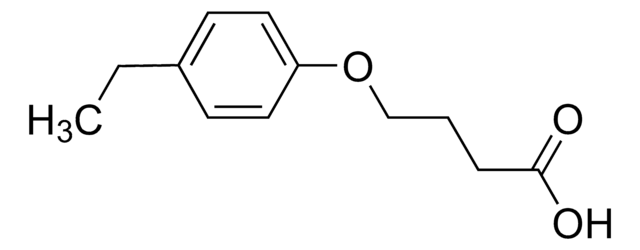All Photos(1)
About This Item
Empirical Formula (Hill Notation):
C4H7NO2
CAS Number:
Molecular Weight:
101.10
MDL number:
UNSPSC Code:
12352200
PubChem Substance ID:
Recommended Products
form
solid
SMILES string
NC1CCOC1=O
InChI
1S/C4H7NO2/c5-3-1-2-7-4(3)6/h3H,1-2,5H2
InChI key
QJPWUUJVYOJNMH-UHFFFAOYSA-N
Other Notes
Please note that Sigma-Aldrich provides this product to early discovery researchers as part of a collection of unique chemicals. Sigma-Aldrich does not collect analytical data for this product. Buyer assumes responsibility to confirm product identity and/or purity. All sales are final.
NOTWITHSTANDING ANY CONTRARY PROVISION CONTAINED IN SIGMA-ALDRICH′S STANDARD TERMS AND CONDITIONS OF SALE OR AN AGREEMENT BETWEEN SIGMA-ALDRICH AND BUYER, SIGMA-ALDRICH SELLS THIS PRODUCT "AS-IS" AND MAKES NO REPRESENTATION OR WARRANTY WHATSOEVER WITH RESPECT TO THIS PRODUCT, INCLUDING ANY (A) WARRANTY OF MERCHANTABILITY; (B) WARRANTY OF FITNESS FOR A PARTICULAR PURPOSE; OR (C) WARRANTY AGAINST INFRINGEMENT OF INTELLECTUAL PROPERTY RIGHTS OF A THIRD PARTY; WHETHER ARISING BY LAW, COURSE OF DEALING, COURSE OF PERFORMANCE, USAGE OF TRADE OR OTHERWISE.
NOTWITHSTANDING ANY CONTRARY PROVISION CONTAINED IN SIGMA-ALDRICH′S STANDARD TERMS AND CONDITIONS OF SALE OR AN AGREEMENT BETWEEN SIGMA-ALDRICH AND BUYER, SIGMA-ALDRICH SELLS THIS PRODUCT "AS-IS" AND MAKES NO REPRESENTATION OR WARRANTY WHATSOEVER WITH RESPECT TO THIS PRODUCT, INCLUDING ANY (A) WARRANTY OF MERCHANTABILITY; (B) WARRANTY OF FITNESS FOR A PARTICULAR PURPOSE; OR (C) WARRANTY AGAINST INFRINGEMENT OF INTELLECTUAL PROPERTY RIGHTS OF A THIRD PARTY; WHETHER ARISING BY LAW, COURSE OF DEALING, COURSE OF PERFORMANCE, USAGE OF TRADE OR OTHERWISE.
Choose from one of the most recent versions:
Certificates of Analysis (COA)
Lot/Batch Number
Sorry, we don't have COAs for this product available online at this time.
If you need assistance, please contact Customer Support.
Already Own This Product?
Find documentation for the products that you have recently purchased in the Document Library.
In Young Hwang et al.
Nature communications, 8, 15028-15028 (2017-04-12)
Bacteria can be genetically engineered to kill specific pathogens or inhibit their virulence. We previously developed a synthetic genetic system that allows a laboratory strain of Escherichia coli to sense and kill Pseudomonas aeruginosa in vitro. Here, we generate a
Olusola Bodede et al.
Journal of ethnopharmacology, 216, 134-146 (2018-02-07)
Senegalia nigrescens is used in traditional medicine for the treatment of dysentery and convulsions. This study was aimed at identifying bioactive compounds from S. nigrescens and carrying out in vitro and in silico anti-quorum sensing studies on the compounds. Extracts
Abraham F Mechesso et al.
Journal of ginseng research, 45(1), 75-85 (2021-01-14)
Invasive infections due to foodborne pathogens, including Salmonella enterica serovar Typhimurium, are prevalent and life-threatening. This study aimed to evaluate the effects of ginsenoside Rg3 (Rg3) on the adhesion, invasion, and intracellular survival of S. Typhimurium. The impacts of Rg3
Krzysztof B Beć et al.
Analytica chimica acta, 1133, 150-177 (2020-10-01)
Infrared (IR; or mid-infrared, MIR; 4000-400 cm-1; 2500-25,000 nm) spectroscopy has become one of the most powerful and versatile tools at the disposal of modern bioscience. Because of its high molecular specificity, applicability to wide variety of samples, rapid measurement and non-invasivity
Hanna Koch et al.
Scientific reports, 10(1), 809-809 (2020-01-23)
Ecological differentiation between strains of bacterial species is shaped by genomic and metabolic variability. However, connecting genotypes to ecological niches remains a major challenge. Here, we linked bacterial geno- and phenotypes by contextualizing pangenomic, exometabolomic and physiological evidence in twelve
Our team of scientists has experience in all areas of research including Life Science, Material Science, Chemical Synthesis, Chromatography, Analytical and many others.
Contact Technical Service








